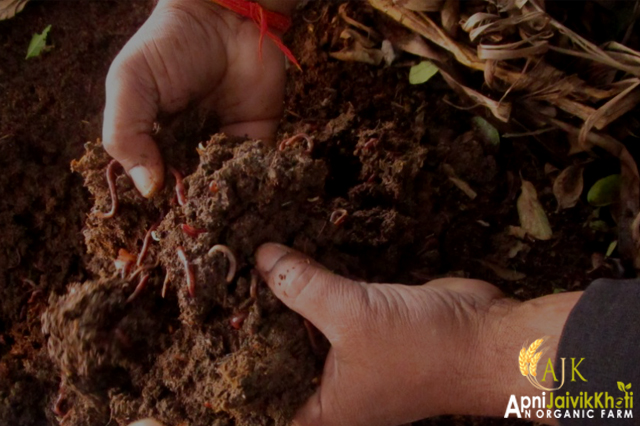Vermicompost play an important role in Organic Farming

The regular addition of compost is one of the best ways to enhance the soil’s organic and humic content, which helps to build a fertile soil structure. This soil structure makes better use of water and nutrients.
It is easier to until and, overall, is healthier ready to reach optimum yields on a long-run basis. Composting also gives farmers a way to recycle manure and plant residues that otherwise might present some environmental problems.
Compost is created through the activity of aerobic (oxygen requiring) microorganisms. These microbes require oxygen, moisture, and food so as to grow and multiply. When these factors are maintained at the best levels, the natural decomposition method is greatly accelerated. The microbes generate heat, water vapor, and carbon dioxide as they rework raw materials into a stable soil conditioner.
Compost has the unique ability to enhance the properties of soils and growing media structurally, nutritionally, and biologically.
Other compost benefits include:
- Improves the soil structure, porosity, and density, thus creating a better plant root environment
- Increases infiltration and permeability of serious soils, thus reducing erosion and runoff
- Improves water holding capacity, thus reducing water loss and leaching in sandy soils
- Supplies a variety of macro and micronutrients
- May control or suppress certain soil-borne plant pathogens
- Supplies significant quantities of organic matter
- Improves ion exchange capacity (CEC) of soils and growing media, therefore up their ability to carry nutrients for plant use
- Supplies beneficial microorganisms to soils and growing media
- Improves and stabilizes soil pH
- Can bind and degrade specific pollutants.
Although the most common way to produce compost is using microorganisms, compost can be also produced using worms. This is called worm compost or vermicompost. This kind of compost is highly valued and is often called black gold. This is because there are not many farmers involved in worm compost production and it takes time to produce.
What is Vermicompost?
Vermicompost is the product or method of composting using numerous worms, sometimes red wigglers, white worms, and other earthworms, to create a heterogeneous mixture of decomposing vegetable or food waste, bedding materials, and vermicast, which are also called worm castings, worm humus or worm manure.
Worms eat food scraps, which become compost as they pass through the worm’s body. Compost exits the worm through its tail end. This compost will then be wont to grow plants. Vermicompost is good for plants because the worms are eating nutrient-rich fruit and vegetable scraps and turning them into nutrient-rich compost.
Earthworms leave soil 5-11% richer in the essential plant nutrients of nitrogen, phosphorus, and potassium than when they first ingest it. As an organic fertilizer, vermicompost is a substitute for synthetic fertilizer in soil-enriched vegetable production. As a soil conditioner, vermicompost is superior to traditional compost due to its ability to improve the soil structure and to increase its water-holding capacity.